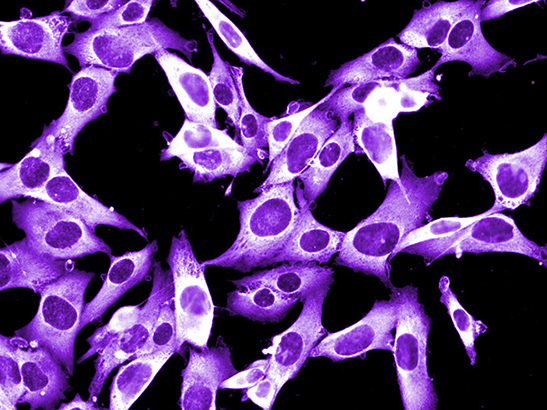
Image: Melanoma cancer cells.
Over half (52 per cent) of people diagnosed with advanced melanoma are now surviving the disease for ten years or more when they receive a combination immunotherapy treatment, according to a study led by researchers at The Royal Marsden NHS Foundation Trust and The Institute of Cancer Research, London.
Just 15 years ago, only 1 in 20 patients with advanced melanoma would survive for five years, with many living for just six to nine months. The results from the Checkmate 067 trial, presented today (Sunday 15 September) at the 2024 ESMO Annual Meeting in Barcelona, Spain, and simultaneously published in The New England Journal of Medicine, includes the longest follow up of any phase III trial of Anti-PD-1 agents for the treatment of cancer.
Anti-PD-1 agents are a type of targeted immunotherapy called an immune checkpoint inhibitor. These drugs work by helping the immune system find and destroy cancer cells as they spread. Ipilimumab and nivolumab have both helped prolong lives and the study showed that, in combination, the results were even better.
Survival rates continue to rise
The latest results show that melanoma specific survival rates continue to separate from overall survival rates, suggesting patients with advanced melanoma are starting to live long enough to die from another cause. At ten years, melanoma specific survival for patients being treated with nivolumab and ipilimumab in combination is 52 per cent. Data also showed that when taken alone, nivolumab had a melanoma specific survival of 44 per cent.
Over two fifths (43 per cent) of patients with stage 4 melanoma are still alive more than ten years after being treated with combination immunotherapy treatment nivolumab and ipilimumab. Data also showed that when taken alone, nivolumab had an overall survival rate of 37 per cent.
Dual therapy has revolutionary impact
The trial saw 945 patients with advanced melanoma randomised into three groups: 314 patients received the ‘double-hit’ of nivolumab plus ipilimumab; 316 patients received nivolumab plus a placebo; and 315 patients received ipilimumab plus placebo. Each nivolumab arm was compared to ipilimumab by itself and was administered until the disease progressed or until any side-effects became unacceptable.
These results demonstrate the sustained benefit and revolutionary impact of dual checkpoint inhibitor therapy on the long-term prognosis of patients with advanced melanoma, highlighting the potential for a cure in some responders.
The data indicates that long term survival is likely in patients whose cancer has not progressed after three years, with melanoma specific survival rates at 96 per cent in the group of patients receiving nivolumab.
'In the past, metastatic melanoma was regarded as untreatable. Over half of patients are now surviving the disease for over ten years'
Professor James Larkin, Consultant Medical Oncologist at The Royal Marsden and Professor of Precision Cancer Therapeutics at the ICR, who presented the results, said:
“In the past, metastatic melanoma was regarded as untreatable, so it’s remarkable that over half of patients treated with nivolumab and ipilimumab are surviving the disease for over ten years, and we are seeing patients live long enough to die from other causes.
“By giving these drugs together you are effectively taking two brakes off the immune system rather than one so that the immune system is able to recognise tumours it wasn't previously recognising, react to that and destroy them.”
Lucy Davis, 47, from London was diagnosed with stage three melanoma in 2011 and had surgery to remove the cancer and surrounding lymph nodes. Two years later she received the devastating news that her disease had progressed to stage four and she had just months to live. Lucy was referred to The Royal Marsden where she joined the Checkmate 067 trial.
“Before I started the trial I was really ill, I could barely eat, I was losing weight and was in a lot of pain, but three months later I felt completely different, my appetite was back and scans showed that the treatment was working. My children were five and seven-years-old when I received the news that I had just months to live, and they are now 16 and 18. I have been able to see them complete their exams and go to college, which is absolutely amazing.
“I’m now on different treatment which comes in a tablet form that I take daily, but I wouldn’t be here without the combination immunotherapy treatment I received, it saved my life.”
Immunotherapy research at The Royal Marsden is supported by The Royal Marsden Cancer Charity. The Checkmate 067 trial is funded by Bristol-Myers Squibb.